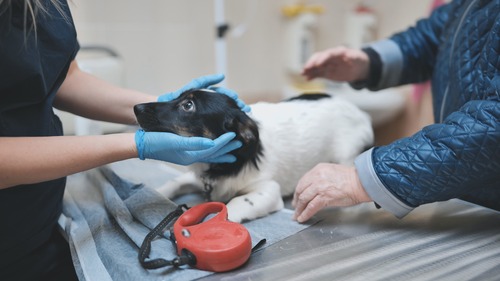Pets can’t tell us when something is wrong, which is why recognizing the signs of a true emergency can feel overwhelming for pet owners. Some issues require prompt attention, and knowing when to take your pet to the emergency vet could make all the difference in their outcome. This blog will walk you through six clear signs that indicate your dog or cat may need urgent medical care. By understanding these warning signals, you’ll feel more confident making quick decisions that protect your pet’s health. If you ever feel uncertain about your pet’s condition, call us at (631) 271-8383 today. Our team in Huntington, NY, can provide emergency vet care at Dix Hills Animal Hospital when your pet needs it most.
1. Difficulty Breathing
Breathing problems in pets should always be taken seriously. If your dog or cat is struggling to breathe, making wheezing noises, or breathing faster than normal while at rest, it’s a strong indicator that they need immediate help from an emergency vet. Even if your pet seems calm, any disruption in oxygen intake can quickly become life-threatening.
Signs of Breathing Distress
- Open-mouth breathing in cats
- Blue or pale gums and tongue
- Coughing that doesn’t stop
- Labored breathing with visible effort
Because breathing is vital for survival, any change in your pet’s ability to get enough air warrants an urgent trip to the emergency vet. Delays could worsen the problem and limit treatment options.
2. Severe or Uncontrolled Bleeding
Not all wounds are emergencies, but heavy bleeding or bleeding that won’t stop is a red flag. Whether your pet has been injured in an accident, bitten by another animal, or suffered a deep cut, blood loss can escalate quickly.
When to Call the Emergency Vet
- Blood that soaks through bandages within minutes
- Bleeding lasting longer than five minutes despite pressure
- Nosebleeds that don’t stop
- Blood in vomit, stool, or urine
An emergency vet at Dix Hills Animal Hospital can stabilize your pet, identify the source of the bleeding, and provide treatment that goes beyond what you can do at home. Even small wounds in sensitive areas, such as the eyes or mouth, can become serious without proper veterinary care.
3. Seizures or Collapse
Watching your pet experience a seizure or sudden collapse can be frightening. These episodes often happen without warning and can indicate serious underlying conditions. Seizures are caused by abnormal electrical activity in the brain, while collapse can result from anything from heart disease to heatstroke.
Signs That Indicate an Emergency
- A seizure lasting more than a couple of minutes
- Multiple seizures within a short period
- Seizures combined with loss of bladder or bowel control
- Fainting, weakness, or sudden inability to stand
Your Huntington emergency vet can run diagnostics to determine what triggered the episode and provide supportive care to prevent further harm. Even if your pet seems normal afterward, prompt veterinary attention is critical.
4. Persistent Vomiting or Diarrhea
Occasional digestive upset isn’t unusual, but repeated vomiting or diarrhea, especially if it continues for more than 24 hours, can lead to severe dehydration or point to a more serious condition.
Red Flags in Gastrointestinal Distress
- Blood in vomit or stool
- Foreign objects visible in vomit or stool
- Inability to keep water down
- Sudden onset of violent or projectile vomiting
Repeated digestive issues can indicate poisoning, intestinal blockages, or organ problems. An emergency vet has the tools to determine what’s going on and begin treatment before your pet’s condition worsens.
5. Trauma or Injury
Accidents happen, and when they do, it’s best to act quickly. Pets hit by cars, bitten by other animals, or injured by falls often require immediate attention even if they appear stable afterward. Internal injuries and shock may not show visible signs right away, which makes prompt evaluation by an emergency vet essential.
Types of Trauma That Require Immediate Care
- Being struck by a vehicle
- Falls from significant heights
- Bite wounds from other pets or wildlife
- Broken bones or dislocated joints
Even if your pet is walking normally, hidden injuries can develop into life-threatening conditions. Visiting the emergency vet ensures that nothing goes unnoticed and that your pet gets the treatment they need without delay.
6. Difficulty Urinating or Defecating
Straining to urinate or defecate can signal a dangerous problem. In cats, a blocked urinary tract is especially common and can become fatal within hours if not treated. Dogs may also experience urinary blockages, constipation, or intestinal obstructions that require urgent veterinary attention.
Warning Signs of a Blockage
- Frequent trips to the litter box or outside with little to no output
- Crying out while attempting to urinate or defecate
- Blood in urine or stool
- Lethargy combined with straining
If your pet shows these signs, a trip to the emergency vet is the safest choice. Early treatment can relieve discomfort and prevent permanent damage.
Acting Quickly Can Save Your Pet’s Life
When your pet shows any of these signs, contacting an emergency vet right away can make the difference between recovery and a worsening condition. Dix Hills Animal Hospital in Huntington, NY, offers emergency veterinary services with compassionate, advanced care for dogs and cats in need. If you believe your pet may need urgent attention, call (631) 271-8383 immediately. Acting fast helps protect your pet’s health and gives them the best chance at a positive outcome.





